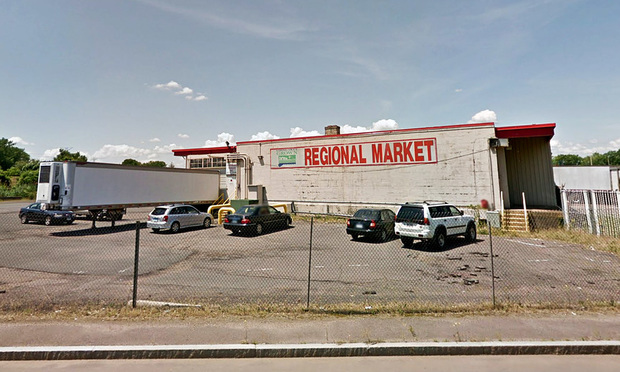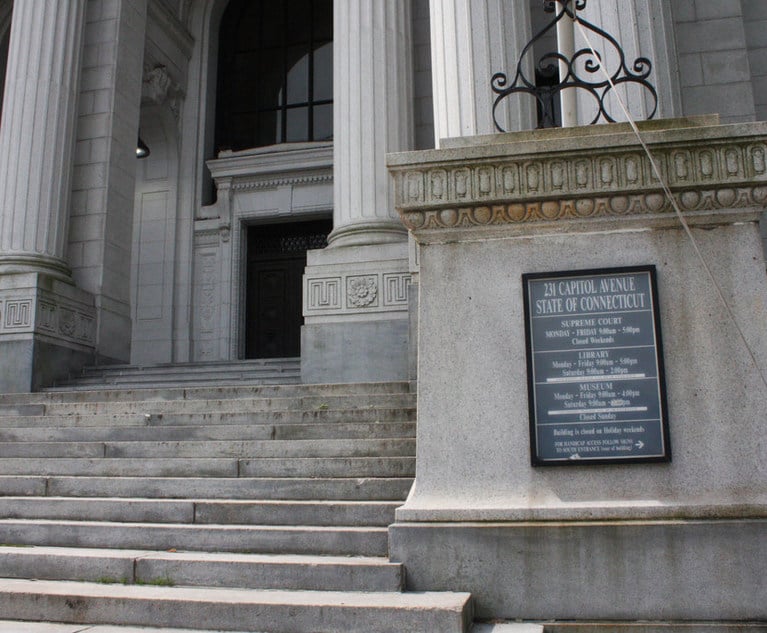From the Editorial Board: Vote 'Yes' on Question 2
Passing bills in the dark is not illegal and happens on other bills, but we should expect greater transparency from our government.
November 04, 2018 at 05:30 PM
3 minute read
 Hartford Regional Market in Connecticut/Credit: Google
Hartford Regional Market in Connecticut/Credit: Google
Question #2 is on the ballot this year with overwhelming bipartisan support to address a real problem associated with the sale, swap and transfer of state-owned public lands.
The problem is not that the General Assembly has the authority to sell, swap and give away valuable state-owned public lands (this is done each year through a so-called public lands conveyance bill, SB 502 this year). The problem is that valuable public lands are being conveyed out of public ownership without receiving the benefit of any public input or meaningful debate. This is done by adding new public lands to the conveyance bill in the waning hours of a legislative session, with no public scrutiny.
Passing bills in the dark is not illegal and happens on other bills, but we should expect greater transparency from our government, especially when the ownership of public lands is being determined.
This year the Hartford Regional Market was transferred on the last day of the legislative session with no public input from the Connecticut Department of Agriculture to the Capitol Region Development Authority (CRDA). This is not a comment on CRDA's ability to be a good steward of this 32-acre property, but a public hearing would have allowed both the proponents and detractors of this transfer to comment publicly on its merits. Before the regional market was transferred, the largest fresh food distribution facility between Boston and New York, a public hearing would have been good public policy.
Passage of Question #2 would amend the state constitution to ensure that before state-owned public lands are sold, swapped or transferred by the General Assembly, it must 1) hold a public hearing, and 2) achieve a two-thirds vote for lands under the care and control of the Department of Energy & Environmental Protection (e.g., state parks, forests, wildlife management areas) or the Department of Agriculture (e.g., state-owned farmlands, or farmland easements).
A constitutional amendment is necessary because the conveyance bill uses powerful language (“Notwithstanding any provision of the general statutes …”) which overrides all existing laws, and a rules change in the Legislature would be ineffective because the rules are suspended at the end of each session to move bills through quickly. Nearby states such as Maine, Massachusetts, and New York have had provisions in their state constitutions protecting public lands in various ways for several decades.
Question #2 would only be triggered by the General Assembly requiring a transfer and does not apply to the administrative actions that state agencies are currently able to take with public lands. For example, the University of Connecticut has the ability to sell state-owned land and there is a public process to do this. A recent example of this was the sale of UConn's campus in West Hartford. It was publicly noticed in the Environmental Monitor, the municipality was given the first right of refusal to acquire the property and then the property was ultimately sold to a private entity.
There are many opportunities for public input along the way when state agencies are doing transfers. So Question #2 was written to provide transparency where it is most lacking, at the General Assembly, and it would help ensure that when public lands are proposed to be conveyed, the public should receive a significant benefit in return. We support voting yes on Question #2 on Nov. 6.
This content has been archived. It is available through our partners, LexisNexis® and Bloomberg Law.
To view this content, please continue to their sites.
Not a Lexis Subscriber?
Subscribe Now
Not a Bloomberg Law Subscriber?
Subscribe Now
NOT FOR REPRINT
© 2025 ALM Global, LLC, All Rights Reserved. Request academic re-use from www.copyright.com. All other uses, submit a request to [email protected]. For more information visit Asset & Logo Licensing.
You Might Like
View All
Coerced Confessions and the Burden of Proof Beyond Reasonable Doubt


35 Years After CT's Affordable Housing Act, Progress Remains a Struggle
4 minute readTrending Stories
- 1January Petitions Press High Court on Guns, Birth Certificate Sex Classifications
- 2'A Waste of Your Time': Practice Tips From Judges in the Oakland Federal Courthouse
- 3Judge Extends Tom Girardi's Time in Prison Medical Facility to Feb. 20
- 4Supreme Court Denies Trump's Request to Pause Pending Environmental Cases
- 5‘Blitzkrieg of Lawlessness’: Environmental Lawyers Decry EPA Spending Freeze
Who Got The Work
J. Brugh Lower of Gibbons has entered an appearance for industrial equipment supplier Devco Corporation in a pending trademark infringement lawsuit. The suit, accusing the defendant of selling knock-off Graco products, was filed Dec. 18 in New Jersey District Court by Rivkin Radler on behalf of Graco Inc. and Graco Minnesota. The case, assigned to U.S. District Judge Zahid N. Quraishi, is 3:24-cv-11294, Graco Inc. et al v. Devco Corporation.
Who Got The Work
Rebecca Maller-Stein and Kent A. Yalowitz of Arnold & Porter Kaye Scholer have entered their appearances for Hanaco Venture Capital and its executives, Lior Prosor and David Frankel, in a pending securities lawsuit. The action, filed on Dec. 24 in New York Southern District Court by Zell, Aron & Co. on behalf of Goldeneye Advisors, accuses the defendants of negligently and fraudulently managing the plaintiff's $1 million investment. The case, assigned to U.S. District Judge Vernon S. Broderick, is 1:24-cv-09918, Goldeneye Advisors, LLC v. Hanaco Venture Capital, Ltd. et al.
Who Got The Work
Attorneys from A&O Shearman has stepped in as defense counsel for Toronto-Dominion Bank and other defendants in a pending securities class action. The suit, filed Dec. 11 in New York Southern District Court by Bleichmar Fonti & Auld, accuses the defendants of concealing the bank's 'pervasive' deficiencies in regards to its compliance with the Bank Secrecy Act and the quality of its anti-money laundering controls. The case, assigned to U.S. District Judge Arun Subramanian, is 1:24-cv-09445, Gonzalez v. The Toronto-Dominion Bank et al.
Who Got The Work
Crown Castle International, a Pennsylvania company providing shared communications infrastructure, has turned to Luke D. Wolf of Gordon Rees Scully Mansukhani to fend off a pending breach-of-contract lawsuit. The court action, filed Nov. 25 in Michigan Eastern District Court by Hooper Hathaway PC on behalf of The Town Residences LLC, accuses Crown Castle of failing to transfer approximately $30,000 in utility payments from T-Mobile in breach of a roof-top lease and assignment agreement. The case, assigned to U.S. District Judge Susan K. Declercq, is 2:24-cv-13131, The Town Residences LLC v. T-Mobile US, Inc. et al.
Who Got The Work
Wilfred P. Coronato and Daniel M. Schwartz of McCarter & English have stepped in as defense counsel to Electrolux Home Products Inc. in a pending product liability lawsuit. The court action, filed Nov. 26 in New York Eastern District Court by Poulos Lopiccolo PC and Nagel Rice LLP on behalf of David Stern, alleges that the defendant's refrigerators’ drawers and shelving repeatedly break and fall apart within months after purchase. The case, assigned to U.S. District Judge Joan M. Azrack, is 2:24-cv-08204, Stern v. Electrolux Home Products, Inc.
Featured Firms
Law Offices of Gary Martin Hays & Associates, P.C.
(470) 294-1674
Law Offices of Mark E. Salomone
(857) 444-6468
Smith & Hassler
(713) 739-1250











